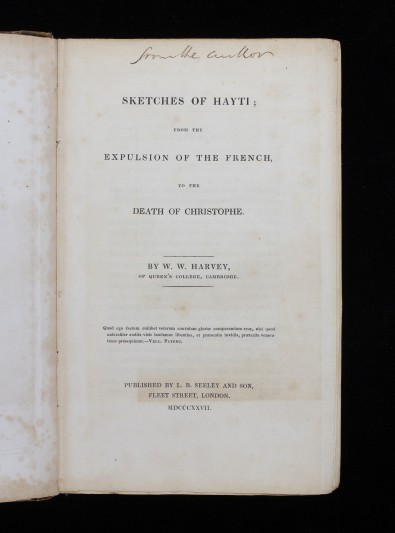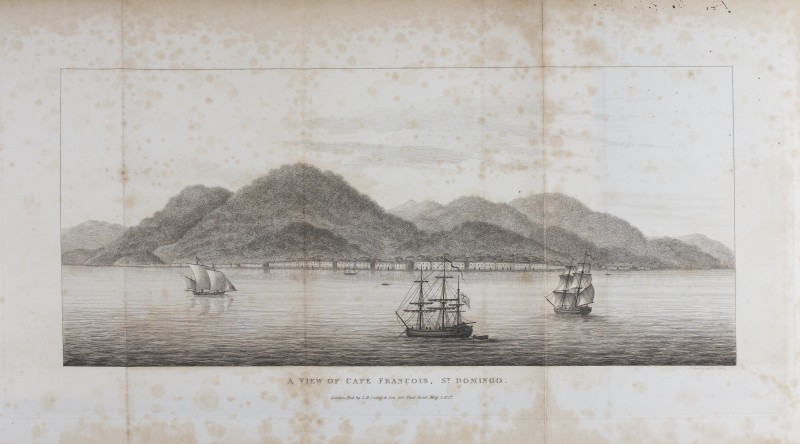Dr Tim Eggington, Fellow Librarian, writes: We are extremely grateful to the Friends of the National Libraries for their generous contribution towards our recent purchase of Sketches of Hayti [Y.1.8] by William Woodis Harvey (1798-1864). Written up by Harvey whilst a student at Queens’ College (1824-7), this book provides an eyewitness account of the aftermath of what was perhaps the most important event in the history of enslavement, the revolution of 1791-1804 that occurred in Haiti (on the Caribbean island of Hispaniola). There, for the first time in history, a violent uprising of enslaved people had brought about the establishment of a new nation state, thereby offering a stark warning to all those who continued to profit from slavery and heralding the possibility of an end to the slave trade. Published at a key moment within the wider context of 19th-century Britain’s debates on slavery, Harvey’s personal account was clearly intended as a means to promote his own abolitionist agenda.
Born in Penzance, Harvey’s early calling as a Wesleyan preacher led him to undertake missionary work in Haiti where he resided from 1818 until 1824. There, he was able to witness the aftermath of the revolution that had occurred following an initial uprising in 1791 in the wake of the French Revolution. Following the combined efforts of both former slaves and colonists to repel British attempts to capture Haiti in 1793-8, independence was proclaimed in 1801 under the rule of the charismatic and formerly enslaved, Toussaint Louverture. He was famously abducted by the French in 1802 following the arrival of a huge fleet despatched by Napoleon to re-take the state and re-impose slavery. Whilst Louverture was taken to France and left to die in a castle, Napoleon’s army was repelled through the resourceful leadership of the formerly enslaved, Jean-Jacques Dessalines, who as president signed a new ‘declaration of independence’ addressed to the people of ‘Hayti’ in 1804.
Harvey claimed that his account drew on his own ‘personal observation’, ‘frequent conversation with the natives and white residents’ and intimacy with ‘those who had dwelt in’ the palace of Henri Christophe (another of Haiti’s early rulers) in order to relate the remarkable events that had followed the declaration of independence. These sources, he believed, had furnished him with ‘more satisfactory answers to such inquiries as naturally suggest themselves concerning a free and independent body of negroes, than could be collected from the occasional notices of their state which appeared in periodicals and gazettes, or from any history that has been written respecting them’ (p. viii-ix). Over 400 pages Harvey set out what he saw as the successes of the Haitians in establishing a state founded on institutions of law, education and industry. A key objective for Harvey was to counter arguments prevalent amongst his compatriots at the time that saw the enslaved people from African as ‘destined by providence to live in subjection to us, and to administer to our pleasure’ (p. 216). On the contrary, Harvey saw in Haiti: ‘a people newly escaped from slavery’ and ‘laudably endeavouring to lay the foundation of an empire, which may perhaps be compared hereafter with nations the most celebrated for their civilization and refinement (p. vii-viii). This copy featured prominently in an Old Library exhibition on slavery (March 2021) which forms part of the college’s ongoing Queens’ College Legacies of Enslavement Project.

